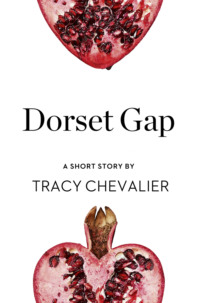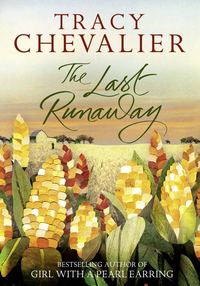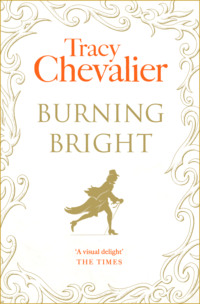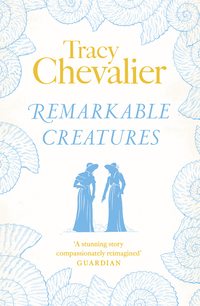
Полная версия
The Virgin Blue

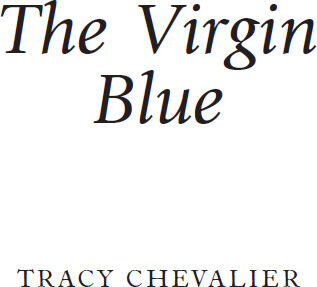

Copyright
The Borough Press
An imprint of HarperCollinsPublishers
77–85 Fulham Palace Road,
Hammersmith, London W6 8JB
www.harpercollins.co.uk
First published in Great Britain by Penguin Group 1997
Copyright © Tracy Chevalier 1997
Chapter head motifs © Neil Gower
Cover layout design © HarperCollinsPublishers Ltd 2014. Cover illustrations © Neil Gower
Tracy Chevalier asserts the moral right to be identified as the author of this work.
A catalogue record for this book is available from the British Library.
This novel is entirely a work of fiction. The names, characters and incidents portrayed in it are the work of the author’s imagination. Any resemblance to actual persons, living or dead, events or localities is entirely coincidental.
All rights reserved under International and Pan-American Copyright Conventions. By payment of the required fees, you have been granted the non-exclusive, non-transferable right to access and read the text of this e-book on screen. No part of this text may be reproduced, transmitted, down-loaded, decompiled, reverse engineered, or stored in or introduced into any information storage and retrieval system, in any form or by any means, whether electronic or mechanical, now known or hereinafter invented, without the express written permission of HarperCollins.
Source ISBN: 9780007241460
Ebook Edition © 2014 ISBN: 9780007324347
Version: 2014-08-05
Dedication
For Jonathan
As yellow is always accompanied with light, so it may be said that blue still brings a principle of darkness with it. This colour has a peculiar and almost indescribable effect on the eye. As a hue it is powerful, but it is on the negative side, and in its highest purity is, as it were, a stimulating negation. Its appearance, then, is a kind of contradiction between excitement and repose.
Goethe, Theory of Colours
Translated by Charles Lock Eastlake
CONTENTS
COVER
TITLE PAGE
COPYRIGHT
DEDICATION
EPIGRAPH
1. The Virgin
2. The Dream
3. The Flight
4. The Search
5. The Secrets
6. The Bible
7. The Dress
8. The Farm
9. The Chimney
10. The Return
EPILOGUE
HISTORICAL NOTE
ACKNOWLEDGEMENTS
ABOUT THE AUTHOR
ALSO BY TRACY CHEVALIER
ABOUT THE PUBLISHER
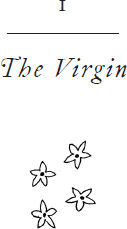
She was called Isabelle, and when she was a small girl her hair changed colour in the time it takes a bird to call to its mate.
That summer the Duc de l’Aigle brought a statue of the Virgin and Child and a pot of paint back from Paris for the niche over the church door. A feast was held in the village the day the statue was installed. Isabelle sat at the bottom of a ladder watching Jean Tournier paint the niche a deep blue the colour of the clear evening sky. As he finished, the sun appeared from behind a wall of clouds and lit up the blue so brightly that Isabelle clasped her hands behind her neck and squeezed her elbows against her chest. When its rays reached her, they touched her hair with a halo of copper that remained even when the sun had gone. From that day she was called La Rousse after the Virgin Mary.
The nickname lost its affection when Monsieur Marcel arrived in the village a few years later, hands stained with tannin and words borrowed from Calvin. In his first sermon, in woods out of sight of the village priest, he told them that the Virgin was barring their way to the Truth.
—La Rousse has been defiled by the statues, the candles, the trinkets. She is contaminated! he proclaimed. She stands between you and God!
The villagers turned to stare at Isabelle. She clutched her mother’s arm.
How can he know? she thought. Only Maman knows.
Her mother would not have told him that Isabelle had begun to bleed that day and now had a rough cloth tied between her legs and a pillow of pain in her stomach. Les fleurs, her mother had called it, special flowers from God, a gift she was to keep quiet about because it set her apart. She looked up at her mother, who was frowning at Monsieur Marcel and had opened her mouth as if to speak. Isabelle squeezed her arm and Maman shut her mouth into a tight line.
Afterwards she walked back between her mother and her sister Marie, their twin brothers following more slowly. The other village children lagged behind them at first, whispering. Eventually, bold with curiosity, a boy ran up and grabbed a handful of Isabelle’s hair.
—Did you hear him, La Rousse? You’re dirty! he shouted.
Isabelle shrieked. Petit Henri and Gérard jumped to defend her, pleased to be useful at last.
The next day Isabelle began wearing a headcloth, every chestnut strand wound out of sight, long before other girls her age.
By the time Isabelle was fourteen two cypress trees were growing in a sunny patch near the house. Each time, Petit Henri and Gérard made the trip all the way to Barre-les-Cévennes, a two-day walk, to find one.
The first tree was Marie’s. She grew so big all the village women said she must be carrying twins; but Maman’s probing fingers felt only one head, though a large one. Maman worried about the size of the head.
—Would that it were twins, she muttered to Isabelle. Then it would be easier.
When the time came Maman sent all the men away: husband, father, brothers. It was a bitterly cold night, a strong wind blowing snow into drifts against the house, the stone walls, the clumps of dead rye. The men were slow to leave the fire until they heard Marie’s first scream: strong men, accustomed to the sounds of slaughtered pigs, the human tone drove them away quickly.
Isabelle had helped her mother at birthings before, but always in the presence of other women visiting to sing and tell stories. Now the cold kept them away and she and Maman were alone. She stared at her sister, immobile beneath a huge belly, shivering and sweating and screaming. Her mother’s face was tight and anxious; she said little.
Throughout the night Isabelle held Marie’s hand, squeezed it during contractions, and wiped her forehead with a damp cloth. She prayed for her, silently appealing to the Virgin and to Saint Margaret to protect her sister, all the while feeling guilty: Monsieur Marcel had told them the Virgin and all the saints were powerless and should not be called upon. None of his words comforted her now. Only the old prayers made sense.
—The head is too big, Maman pronounced finally. We have to cut.
—Non, Maman, Marie and Isabelle whispered in unison. Marie’s eyes were wild and dilated. In desperation she began to push again, weeping and gasping. Isabelle heard the sound of flesh tearing; Marie shrieked before going limp and grey. The head appeared in a river of blood, black and misshapen, and when Maman pulled the baby out it was already dead, the cord tight around its neck. It was a girl.
The men returned when they saw the fire, smoke from the bloody straw billowing high into the morning air.
They buried mother and child in a sunny spot where Marie had liked to sit when it was warm. The cypress tree was planted over her heart.
The blood left a faint trace on the floor that no amount of sweeping or scrubbing could erase.
The second tree was planted the following summer.
It was twilight, the hour of wolves, not the time for women to be walking on their own. Maman and Isabelle had been at a birthing at Felgérolles. Mother and baby had both lived, breaking a long string of deaths that had begun with Marie and her baby. This evening they had lingered, making the mother and child comfortable, listening to the other women singing and chatting, so that the sun had sunk behind Mont Lozère by the time Maman waved away cautions and invitations to stay the night and they started home.
The wolf lay across the path as if waiting for them. They stopped, set down their sacks, crossed themselves. The wolf did not move. They watched it for a moment, then Maman picked up her sack and took a step toward it. The wolf stood and Isabelle could see even in the dark that it was thin, its grey pelt mangy. Its eyes glowed yellow as if a candle were lit behind them, and it moved in an awkward, off-balance lope. Only when it was so close that Maman could almost reach out and touch the greasy fur did Isabelle see the foam around its mouth and understand. Everyone had seen animals struck with the madness: dogs running aimlessly, foam flecking their mouths, a new meanness in their eyes, their barks muffled. They avoided water; the surest protection from them, besides an axe, was a brimming bucket. Maman and Isabelle had nothing with them but herbs, linen and a knife.
As it leapt Maman raised her arm instinctively, saving twenty days of her life but wishing afterwards that she had let it rip out her throat quickly and mercifully. When it fell back, when the blood was streaking down Maman’s arm, the wolf looked at Isabelle briefly and disappeared into the dark without a sound.
While Maman told her husband and sons about the wolf with candles in its eyes, Isabelle cleaned the bite with water boiled with shepherd’s purse and laid cobwebs over it before binding the arm with soft wool. Maman refused to sit still, insisted on picking her plums, working in the kitchen garden, continuing as if she had not seen the truth shining in the wolf’s eyes. After a day her forearm had swelled to the same size as her upper arm, and the area around the wound went black. Isabelle made an omelette, added rosemary and sage, and mouthed a silent prayer over it. When she brought it to her mother she began to cry. Maman took the bowl from her and ate steadily, her eyes on Isabelle, tasting death in the sage, until the omelette was gone.
Fifteen days later she was drinking water when her throat began to contract in spasms, pumping water down the front of her dress. She looked at the black patch spreading on her chest, then sat in the late summer sun on the bench next to the door.
Fever came fast, and so furious that Isabelle prayed death would come as swiftly to relieve her. But Maman fought, sweating and shouting in her delirium, for four days. On the last day, when the priest from Le Pont de Montvert arrived to perform the last rites, Isabelle held a broom across the doorway and spat at him until he left. Only when Monsieur Marcel arrived did she drop the broom and stand by to let him pass.
Four days later the twins returned with the second cypress tree.
The crowd gathered in front of the church was not used to victory, nor familiar with the conduct of celebration. The priest had finally slipped away three days before. They were sure now that he was gone – the woodcutter Pierre La Forêt had seen him miles away, all the possessions he could carry piled on his back.
The early winter snow covered the smooth parts of the ground with a thin gauze, wrecked in places by leaves and rocks. There was more to come, with the sky the colour of pewter to the north, up beyond the summit of Mont Lozère. A layer of white lay on the thick granite tiles of the church roof. The building was empty. No mass had been said there since the harvest: attendance had dropped as Monsieur Marcel and his followers grew more confident.
Isabelle stood among her neighbours listening to Monsieur Marcel, who paced in front of the door, severe in his black clothes and silver hair. Only his red-stained hands undermined his commanding presence, a reminder to them that he was after all simply a cobbler.
When he spoke he focused on a point over the crowd’s head.
—This place of worship has been the scene of corruption. It is in safe hands now. It is in your hands. He gestured before him as if he were sowing seed. A hum rose from the crowd.
—It must be cleansed, he continued. Cleansed of its sin, of these idols. He waved a hand at the building behind him. Isabelle stared up at the Virgin, the blue behind the statue faded but with a power still to move her. She had already touched her forehead and her chest before she realized what she was doing and managed to stop without completing the cross. She glanced around to see if the gesture had been noticed. But her neighbours were looking at Monsieur Marcel, calling to him as he strode through them and continued up the hill toward the bank of dark cloud, tawny hands tucked behind him. He did not look back.
When he was gone the crowd grew louder, more agitated. Someone shouted:— The window! The cry was taken up. Above the door, a small circular window held the only piece of glass they had ever seen. The Duc de l’Aigle had installed it beneath the niche three summers ago, just before he was touched with the Truth by Calvin. From the outside the window was a dull brown, but from the inside it was green and yellow and blue, with a tiny dot of red in Eve’s hand. The Sin. Isabelle had not been inside the church for a long time, but she remembered the scene well, Eve’s look of desire, the serpent’s smile, Adam’s shame.
If they could have seen it once more, the sun lighting up the colours like a field dense with summer flowers, its beauty might have saved it. But there was no sun, and no entering the church: the priest had slipped a large padlock through the bolt across the door. They had not seen one before; several men had examined it, pulled at it, uncertain of its mechanism. An axe would have to be taken to it, carefully, to keep it intact.
Only the knowledge of the window’s value held them back. It belonged to the Duc, to whom they owed a quarter of their crops, in turn receiving protection, the assurance of a whisper in the ear of the King. The window and the statue were gifts from him. He might still value them.
No one knew for certain who threw the stone, though afterwards several people claimed they had. It struck the centre of the window and shattered it immediately. It was a sound so strange that the crowd hushed. They had not heard glass break before.
In the lull a boy ran over and picked up a shard of glass, then howled and threw it down.
—It bit me! he cried, holding up a bloody finger.
The shouting began again. The boy’s mother snatched him and pressed him to her.
—The devil! she screamed. It was the devil!
Etienne Tournier, hair like burnt hay, stepped forward with a long rake. He glanced back at his older brother, Jacques, who nodded. Etienne looked up at the statue and called loudly:— La Rousse!
The crowd shifted, steps sideways that left Isabelle standing alone. Etienne turned round with a smirk on his face, pale blue eyes resting on her like hands pressing into her.
He slid his hand down the handle and hoisted the rake up, letting the metal teeth descend and hover in front of her. They stared at each other. The crowd had gone quiet. Finally Isabelle grabbed the teeth; as she and Etienne held each end of the rake she felt a fire ignite below her belly.
He smiled and let go, his end tapping the ground. Isabelle grasped the pole and began walking her hands down it, lifting the teeth end of the rake into the air, until she reached him. As she looked up at the Virgin, Etienne took a step back and disappeared from her side. She could feel the press of the crowd, bunched together again, restless, murmuring.
—Do it, La Rousse! someone shouted. Do it!
In the crowd Isabelle’s brothers stood staring at the ground. She could not see her father, but if he was there as well he could not help her.
She took a deep breath and raised the rake. A shout rose with it, making her arm shake. She let the rake teeth rest to the left of the niche and looked around at the mass of bright red faces, unfamiliar now, hard and cold. She raised the rake, propped it against the base of the statue and pushed. It did not move.
The shouting became harsher as she began to push harder, tears pricking her eyes. The Child was staring into the distant sky, but Isabelle could feel the Virgin’s gaze on her.
—Forgive me, she whispered. Then she pulled the rake back and swung it as hard as she could at the statue. Metal hit stone with a dull clang and the face of the Virgin was sliced off, showering Isabelle and making the crowd shriek with laughter. Desperately she swung the rake again. The mortar loosened with the blow and the statue rocked a little.
—Again, La Rousse! a woman shouted.
I can’t do it again, Isabelle thought, but the sight of the red faces made her swing once more. The statue began to rock, the faceless woman rocking the child in her arms. Then it pitched forward and fell, the Virgin’s head hitting the ground first and shattering, the body thumping after. In the impact of the fall the Child was split from his mother and lay on the ground gazing upward. Isabelle dropped the rake and covered her face with her hands. There were loud cheers and whistles and the crowd surged forward to surround the broken statue.
When Isabelle took her hands from her face Etienne was standing in front of her. He smiled triumphantly, reached over and squeezed her breasts. Then he joined the crowd and began throwing dung at the blue niche.
I will never see such a colour again, she thought.
Petit Henri and Gérard needed little convincing. Though Isabelle blamed Monsieur Marcel’s persuasiveness, secretly she knew they would have gone anyway, even without his honeyed words.
—God will smile upon you, he had said solemnly. He has chosen you for this war. Fighting for your God, your religion, your freedom. You will return men of courage and strength.
—If you return at all, Henri du Moulin muttered angrily, words only Isabelle heard. He leased two fields of rye and two of potatoes, as well as a fine chestnut grove. He kept pigs and a herd of goats. He needed his sons; he couldn’t farm the land with only his daughter left to help him.
—I will plant fewer fields, he told Isabelle. Only one of rye, and I’ll give up some of the herd and a few pigs. Then I’ll only need one field of potatoes to feed them. I can get more animals again when the twins return.
They won’t come back, she thought. She had seen the light in their eyes as they left with other boys from Mont Lozère. They will go to Toulouse, to Paris, to Geneva to see Calvin. They will go to Spain, where men’s skin is black, or to the ocean on the edge of the world. But here, no, they will not come back here.
She gathered her courage one evening as her father sat sharpening a plough blade by the fire.
—Papa, she ventured. I could marry and we could live here and work with you.
With one word he stopped her.
—Who? he asked, whetting stone paused over the blade. The room was quiet without the rhythmic sound of metal against stone.
She turned her face away.
—We are alone, you and I, ma petite. His tone was gentle. But God is kinder than you think.
Isabelle clasped her neck nervously, still carrying the taste of communion in her mouth – rough, dry bread that remained in the back of her throat long after she had swallowed. Etienne reached up and pulled at her headcloth. He found the end, wound it around his hand and gave a sharp tug. She began to spin, turning and turning out of the cloth, her hair unfurling, seeing flashes of Etienne with a grim smile on his face, then her father’s chestnut trees, the fruit small and green and far out of reach.
When she was free of the cloth she stumbled, regained her balance, hesitated. She faced him but stepped backwards. He reached her in two strides, tripped her and tumbled on top of her. With one hand he pulled up her dress while the other buried itself in her hair, fingers splayed, pulling through like a comb to the ends, wrapping the hair around it as it had wound the cloth a moment earlier, until his fist was resting at the nape of her neck.
—La Rousse, he murmured. You’ve avoided me for a long time. Are you ready?
Isabelle hesitated, then nodded. Etienne pulled her head back by her hair to lift her chin up and bring her mouth to his.
—But the communion of the Pentecost is still in my mouth, she thought, and this is the Sin.
The Tourniers were the only family between Mont Lozère and Florac to own a Bible. Isabelle had seen it at services, when Jean Tournier carried it wrapped in linen and handed it ostentatiously to Monsieur Marcel. He watched it, fretful, throughout the service. It had cost him.
Monsieur Marcel laced his fingers together and held the book in the cradle of his arms, propped against the curve of his paunch. As he read he swayed from side to side as if he were drunk, though Isabelle knew he could not be, since he had forbidden wine. His eyes moved back and forth, and words appeared in his mouth, but it was not clear to her how they got there.
Once the Truth was established inside the old church, Monsieur Marcel had a Bible brought from Lyons, and Isabelle’s father built a wooden stand to hold it. Then the Tourniers’ Bible was no longer seen, though Etienne still bragged about it.
—Where do words come from? Isabelle asked him one day after service, ignoring the eyes on them, the glare from Etienne’s mother, Hannah. How does Monsieur Marcel get them from the Bible?
Etienne was tossing a stone from hand to hand. He flicked it away; it rustled to a stop in the leaves.
—They fly, he replied firmly. He opens his mouth and the black marks from the page fly to his mouth so quickly you can’t see them. Then he spits them out.
—Can you read?
—No, but I can write.
—What do you write?
—I write my name. And I can write your name, he added confidently.
—Show me. Teach me.
Etienne smiled, teeth half-showing. He took a fistful of her skirt and pulled.
—I will teach you, but you must pay, he said softly, his eyes narrowed till the blue barely showed.
It was the Sin again: chestnut leaves crackling in her ears, fear and pain, but also the fierce excitement of feeling the ground under her, the weight of his body on her.
—Yes, she said finally, looking away. But show me first.
He had to gather the materials secretly: the feather from a kestrel, its point cut and sharpened; the fragment of parchment stolen from a corner of one of the pages of the Bible; a dried mushroom that dissolved into black when mixed with water on a piece of slate. Then he led her up the mountain, away from their farms, to a granite boulder with a flat surface that reached her waist. They leaned against it.
Miraculously, he drew six marks to form ET.
Isabelle stared at it.
—I want to write my name, she said. Etienne handed her the feather and stood behind her, his body pressed against the length of her back. She could feel the hard growth at the base of his stomach and a flicker of fearful desire raced through her. He placed his hand over hers and guided it first to the ink, then to the parchment, pushing it to form the six marks. ET, she wrote. She compared the two.


